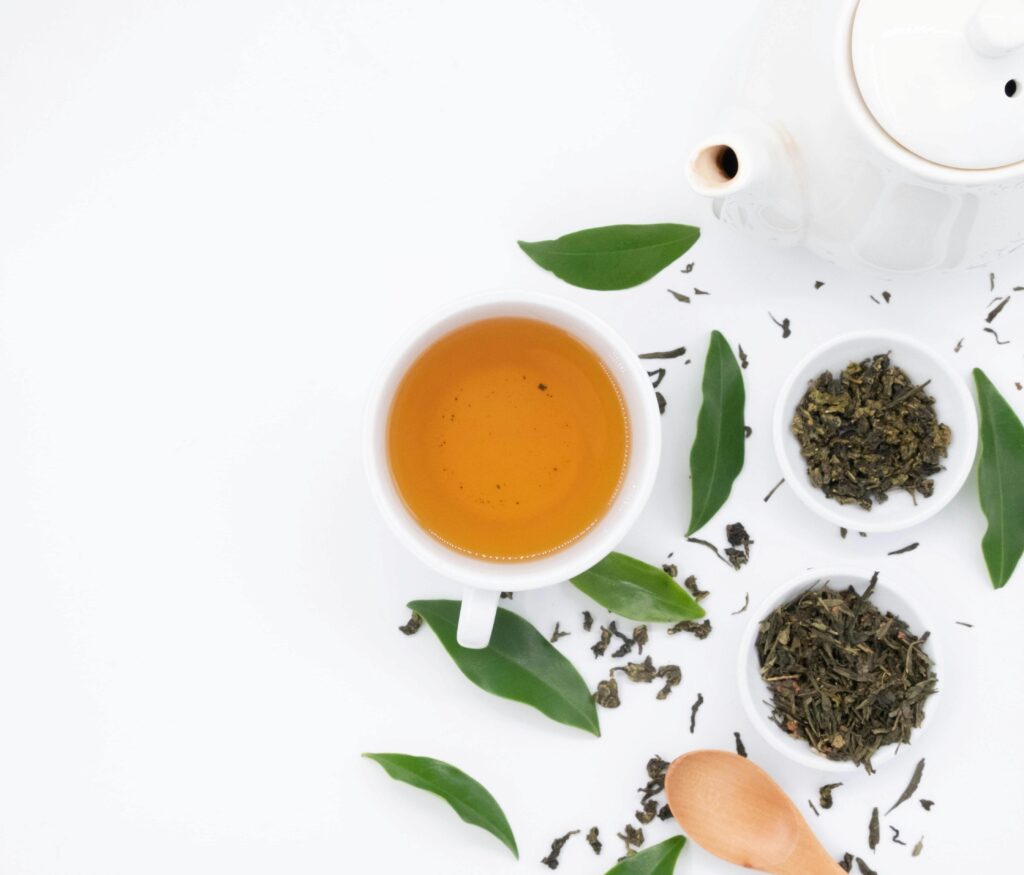Green Tea and Herbal Teas for Mental Health
One of the simplest yet most effective options is green tea and herbal teas for mental health.
These soothing beverages offer more than comfort:they may also play a meaningful role in reducing stress, improving mood, and enhancing cognitive function.
Let’s explore how a warm cup of tea can become a gentle yet powerful ally in your mental wellness routine.

1. How Green Tea and Herbal Teas for Mental Health Reduce Stress
Stress is one of the most common factors affecting mental health today. Fortunately, certain compounds in tea can directly influence how your body responds to stress.
For example, green tea contains L-theanine, an amino acid known to promote relaxation without drowsiness. When paired with the mild caffeine content in green tea, L-theanine helps improve focus while reducing anxiety.
In addition, many herbal teas, like chamomile, lemon balm, and lavender, are known for their calming effects. These herbs can help relax the nervous system, making them excellent options for winding down after a long day.
2. Supporting Sleep with Green Tea and Herbal Teas for Mental Health
Sleep and mental health are deeply connected. When your sleep suffers, your mood and cognitive function often follow.
Thankfully, herbal teas can support better sleep naturally.
Chamomile tea, for instance, has been used for centuries as a gentle sleep aid. It contains apigenin, a compound that binds to brain receptors involved in sleepiness. Similarly, valerian root and passionflower tea are often recommended for people struggling with insomnia or restlessness.
Even green tea, when consumed in its decaffeinated form, may help promote relaxation and prepare the mind for sleep.
3. Green Tea and Herbal Teas for Mental Health Enhance Mood
Beyond reducing stress and aiding sleep, tea can also lift your mood. The ritual of brewing and sipping tea encourages mindfulness, helping you slow down and reconnect with the present moment.
Moreover, the antioxidants in green tea, particularly catechins, have been linked to improved mood regulation. These antioxidants reduce inflammation and oxidative stress, both of which are thought to contribute to depression and anxiety.
Some herbal teas, such as St. John’s Wort and Rhodiola, may also have mild antidepressant effects, though they should be used cautiously and preferably under the guidance of a healthcare provider.
4. Boosting Cognitive Function with Tea Rituals
Mental clarity and sharp thinking are crucial to overall well-being. Green tea and several herbal infusions support brain function in different ways.
Green tea’s blend of caffeine and L-theanine provides a calm yet alert state of mind, often described as “relaxed focus.”
At the same time, herbs like ginkgo biloba and gotu kola have been traditionally used to enhance memory and concentration.
These teas can be especially helpful for people experiencing mental fatigue or difficulty concentrating due to stress or burnout.
5. Gut-Brain Connection and the Role of Herbal Teas
Recent research has highlighted the importance of gut health in relation to mental well-being. Interestingly, certain teas can support the gut-brain axis.
Peppermint and ginger teas, for example, aid digestion and reduce inflammation. A healthy gut microbiome can influence mood, stress resilience, and even anxiety levels.
Therefore, drinking gut-friendly teas regularly may contribute to better mental balance over time.
6. Creating a Mindful Tea-Drinking Ritual for Mental Health
One of the most underrated aspects of green tea and herbal teas for mental health is the mindfulness involved in preparing and drinking tea.
Instead of rushing, the act of slowing down to boil water, select your favorite blend, and savor each sip can become a form of self-care.
By making tea drinking a daily ritual, you not only enjoy its physical benefits but also cultivate a calm, intentional space that nourishes your mental state.
7. Choosing the Right Tea for Your Mental Needs
With so many options available, it’s important to choose the right tea based on your specific mental health goals.
For stress and sleep, calming herbs like chamomile, lavender, and valerian are ideal.
For focus and mood, green tea, ginseng, and lemon balm may be more beneficial.
It’s worth experimenting to find the blends that work best for your body and lifestyle.
Most importantly, listen to how your mind and body respond to each cup.
Conclusion: A Simple Step Toward Greater Mental Wellness
Incorporating green tea and herbal teas for mental health into your routine is a simple yet effective way to support your emotional well-being.
While not a substitute for professional treatment when needed, tea can be a meaningful addition to a holistic self-care practice.
So next time you’re feeling overwhelmed or anxious, take a moment to brew a cup of calm. It might be just what your mind needs.
